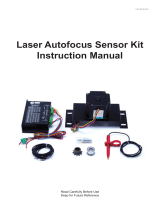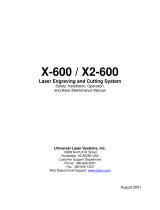
7
• DO NOT use or leave sensitive EMI equipment nearby. Ensure the area around the laser is free of strong electromagnetic
interference during any use.
• ONLY use this machine as described in the Material Safety section of this manual. The laser settings and engraving
process must be properly adjusted for specific materials.
• Ensure the area is kept free of airborne pollutants, as these might pose a similar risk of reflection, combustion, etc.
• NEVER use this marking machine with the fiber source’s housing opened, as the closed laser light path is necessary
to prevent laser radiation leakage.
• DO NOT modify or disassemble the laser and do not use the laser if it has been modified or disassembled by anyone
except trained and skilled professionals. Dangerous radiation exposure and other injury may result from the use of
adjusted, modified, or otherwise incompatible equipment.
2.4 Electrical Safety Instructions
• ONLY use this device with a compatible and stable power supply with less than 5% fluctuation in its voltage.
• DO NOT connect other devices to the same fuse, as the laser system will require its full amperage. Do not use with
standard extension cords or power strips. Use only surge protectors rated over 2000J.
• ONLY turn on the power to this device when it is well grounded, either via a firm connection to
a 3-prong outlet or via a dedicated grounding cable firmly connected to the proper slot on the back
of the main tower. Do not use with an ungrounded 3 to 2 prong adapter. The device's grounding
should be checked regularly for any damage to the line or loose connections.
• Turn the device on and off using its key and power buttons in the correct order. The mainboard,
galvanometer, and laser have separate power supplies that are grounded in order. Activating
everything at once, too quickly, or in the wrong order may send electrical current to an
ungrounded component, causing short circuits and other electrical hazards.
• ONLY use this device with one hand at a time. The laser is powered by an extremely high voltage connection
and placing two hands on the machine at one time during operation has the potential to create a closed circuit with
the human body, resulting in electrical shock.
• The area around this laser marking device should be kept dry, well ventilated, and environmentally controlled to
keep the ambient temperature between 40–95°F (5–35°C). The ambient humidity should not exceed 70%.
• Adjustment, maintenance, and repair of the electrical components of this device must be done ONLY by trained
and skilled professionals to avoid fires and other malfunctions, including potential radiation exposure from
damage to the laser components. Because specialized techniques are required for testing the electrical components
of this marking system, it is recommended such testing only be done by the manufacturer, seller, or repair service.
• Unless otherwise specified, ONLY undertake adjustment, maintenance, and repair of the device when it is turned
off and disconnected from its power supply.
2.5 Material Safety Instructions
• Users of this fiber marking machine are responsible for confirming that materials to be processed can withstand the
heat of a class 4 laser and will not produce any emissions or byproducts either harmful to people nearby or in violation
of any local or national laws or regulations. In particular, do not use this device to process polyvinyl chloride (PVC),
teflon, or other halogen containing materials under any circumstances.
• Users of this fiber laser are responsible for ensuring that every person present during operation has sufficient PPE to avoid
any injury from emissions or byproducts of the materials being processed. In addition to the protective laser eyewear
discussed above, this may require goggles, masks or respirators, gloves, and other protective outer clothing.
• Users must exercise special caution when working with conductive materials as buildup of their dust and ambient
particles may damage electrical components, cause short circuits, or produce other effects including reflected laser
radiation.
























